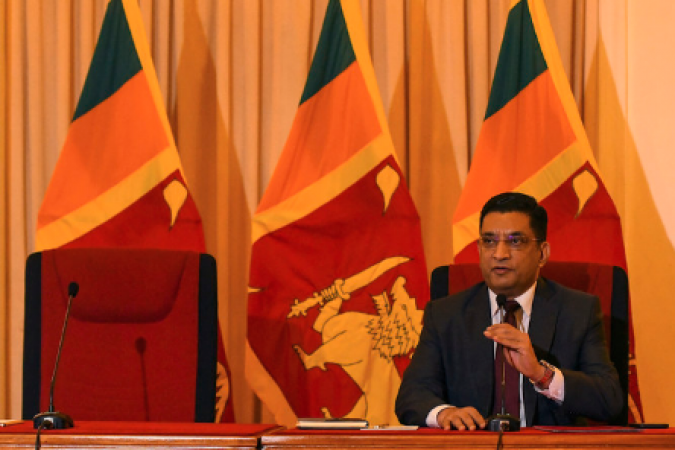
Against the backdrop of a dire economic crisis, Sri Lanka is orchestrating a strategic shift in its foreign policy, redirecting its focus towards the Middle East.
With an acute need for financial assistance, the island nation is recalibrating its diplomatic endeavors to forge stronger ties with countries in the Middle East, known for their economic affluence and potential to provide vital support.
As Sri Lanka grapples with an economic downturn of significant magnitude, the government is turning to the Middle East for much-needed aid. Renowned for housing some of the world's wealthiest nations, this region presents an appealing reservoir of resources that Sri Lanka hopes to tap into to alleviate its financial woes.
Also Read: Indian Air Force Bolsters Delhi's Airspace Security Ahead of G20 Summit
The surge of high-level visits from Sri Lankan officials to Middle Eastern countries underscores this newfound orientation. Notably, engagements with prominent nations such as Saudi Arabia, the United Arab Emirates, and Qatar have yielded a series of agreements, including commitments to extend financial support to Sri Lanka.
In tandem with soliciting financial assistance, Sri Lanka is keen on fostering investments from the Middle East. The government is actively courting investments in sectors of paramount significance, spanning tourism, infrastructure, and energy. This dual approach of financial aid and investment stimulation underscores the multifaceted nature of Sri Lanka's strategic pivot.
This departure in Sri Lanka's foreign policy carries profound implications, echoing beyond its immediate geographical scope. Historically, Sri Lanka has maintained robust affiliations with India and China. However, the economic exigencies have compelled the nation to seek alternative avenues of support, leading to a shift in its traditional alliances.
Also Read: New York Attorney General Pushes for Swifter Verdict in Fraud Lawsuit Against Donald Trump
This recalibration towards the Middle East not only capitalizes on the region's financial affluence but also leverages existing socio-cultural and economic linkages. A substantial Sri Lankan diaspora residing in the Middle East serves as a bridge between the two regions, facilitating a conducive atmosphere for this strategic realignment.
The ramifications of this foreign policy shift are nuanced and far-reaching. It stands to potentially intensify the competition for influence between India and China in Sri Lanka. Additionally, the transformation could bestow Sri Lanka with a more assertive foreign policy stance as it endeavors to secure its interests in the Middle East.
The recalibration of Sri Lanka's foreign policy reflects the dynamic landscape of the region. The Middle East is increasingly emerging as a cornerstone in Sri Lanka's strategic considerations, a reality underlined by the country's eagerness to cultivate robust relations with Middle Eastern nations.
The multifaceted motivations underpinning Sri Lanka's shift in foreign policy to embrace the Middle East are as follows:
Tapping into Wealth Resources: The Middle East is celebrated for hosting some of the globe's most affluent nations, and Sri Lanka aspires to harness this economic potential.
Attracting Investments: The Middle East serves as a hub for foreign direct investment, and Sri Lanka is eagerly courting investments in vital sectors like tourism, infrastructure, and energy to stimulate economic growth.
Expanding Trade Horizons: The Middle East presents an expansive market for Sri Lankan exports, offering an avenue to fortify trade relations.
Strengthening Security and Strategic Interests: The Middle East's strategic significance augments Sri Lanka's motivation to bolster security ties with the region, aligning with broader geopolitical dynamics.
The transition in Sri Lanka's foreign policy marks a seminal moment, not only for the nation itself but also for the evolving global landscape. It beckons attention to the shifting sands of international relations, wherein Sri Lanka is meticulously recalibrating its priorities and alliances in response to pressing economic challenges.
The growing emphasis on the Middle East underscores Sri Lanka's determination to transcend traditional partnerships in pursuit of sustainable economic revival. However, the strategic pivot does not exist in isolation; it is inherently intertwined with the intricate matrix of international geopolitics.
As Sri Lanka maneuvers through this pivotal juncture, it navigates a complex web of economic necessities, geopolitical dynamics, and regional aspirations. This recalibration speaks to the multifaceted nature of foreign policy decisions, which entail both immediate benefits and far-reaching consequences.
Also Read: Egyptian Cargo Ship Rescues 150 Migrants Stranded off Greek Coast
Ultimately, Sri Lanka's embrace of the Middle East is a strategic choice propelled by the necessity to address its immediate economic crisis. The nation's course of action serves as a reminder of the intricate interplay between economic exigencies and diplomatic maneuvering in an increasingly interconnected world. As the island nation looks eastwards for economic sustenance, the echoes of this strategic pivot will reverberate across continents and contexts, shaping the nation's trajectory in an evolving global order.